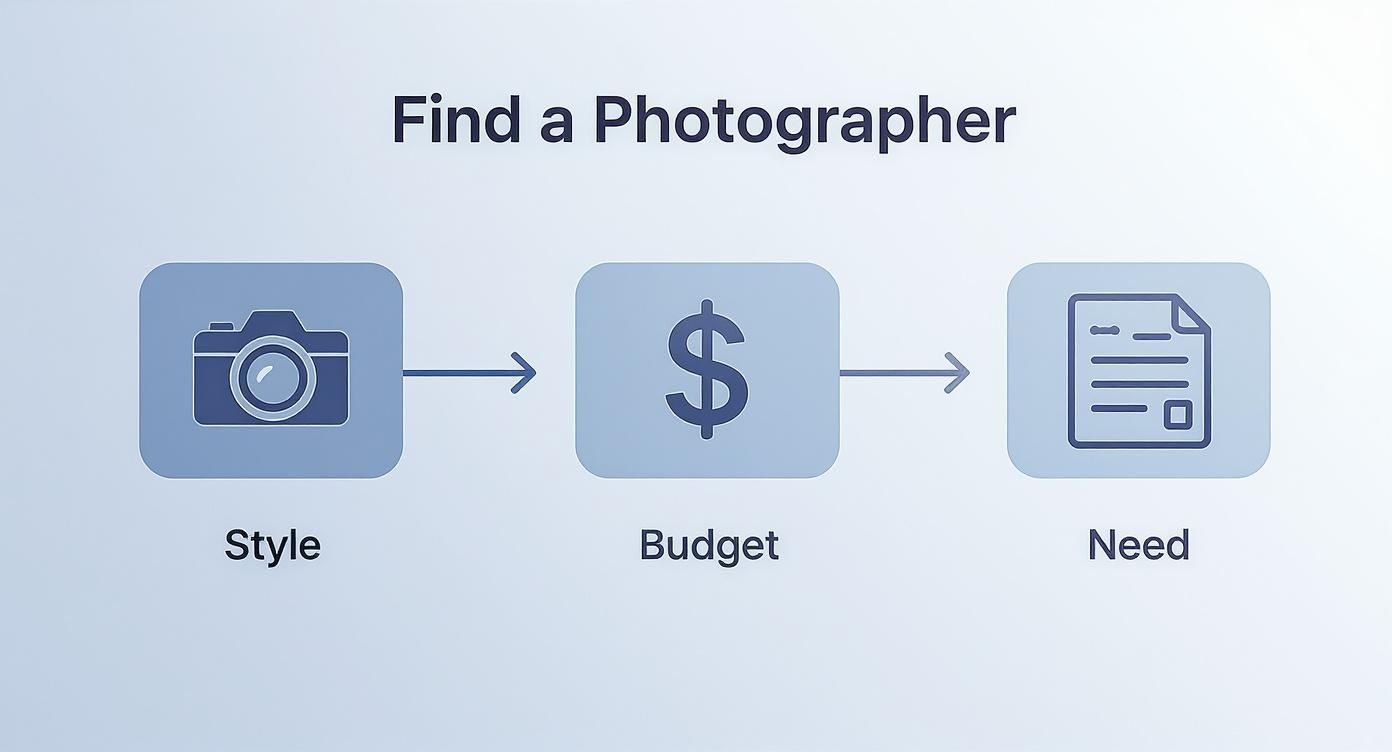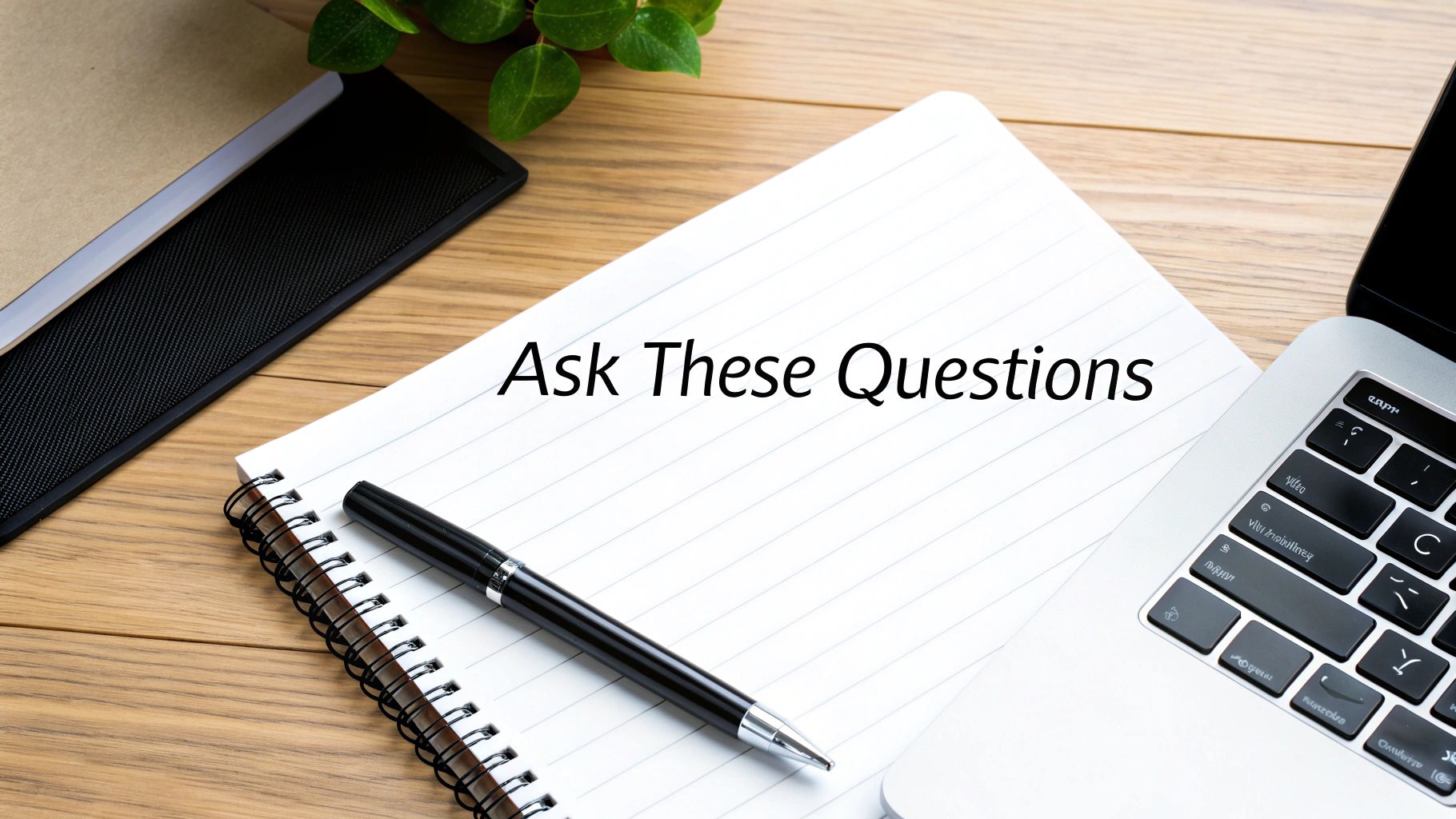Before you even type "photographer near me" into a search bar, pump the brakes. Taking a little time to figure out what you actually need is the single best thing you can do to make your search a success. Seriously.
This planning phase is everything. It’s what ensures you find a pro who not only fits your budget but totally gets your creative vision.
Clarify Your Vision Before You Search
The first move in finding the right local photographer has nothing to do with scrolling through profiles and everything to do with a little self-reflection.
Jumping into portfolios without a clear idea of your goals is like grocery shopping when you're starving—everything looks amazing, but you'll probably leave with a cart full of stuff you don't actually need. You need a game plan.
What’s the end result you’re dreaming of? Are you after warm, candid family photos that feel like a real slice of your life? Or do you need crisp, professional headshots for your company's new website? The photographer who’s a rockstar at one might not be the right fit for the other.
Define Your Photography Style
Every photographer has their own artistic vibe. Getting a handle on the basic styles will help you cut through the noise and find your person way faster.
- Documentary/Candid: This is all about capturing real, unposed moments as they unfold. It’s perfect for events or family sessions where you want to remember genuine emotions and interactions, not just stiff poses.
- Classic/Posed: This is a more traditional take, involving carefully composed shots where everyone is looking at the camera. Think formal portraits, corporate headshots, and timeless wedding photos.
- Moody & Dramatic: Known for its deep shadows, rich colors, and emotional punch. This style gives off a cinematic feel and is often used for artistic portraits, edgy brand campaigns, and intimate elopements.
- Light & Airy: A super popular style that uses soft, natural light to create bright, clean, and often romantic images. It has a dreamy, almost ethereal quality to it.
Once you've identified a style that you love, you can immediately filter out photographers whose work doesn't match your vision. Trust me, this will save you hours of scrolling.
Set a Realistic Budget
Let’s be real: photography is a significant investment. It's a massive industry for a reason. The global photography market was valued at around $105.2 billion in 2023 and is only expected to grow as the demand for high-quality visuals keeps climbing.
A photographer's price tag reflects their experience, gear, editing time, and all the costs of running a business. When you're setting your budget, remember what you’re paying for. It's not just the hour they spend shooting; it's the years of skill, the thousands of dollars in equipment, and the countless hours spent in post-production.
To keep your project on track and your expectations clear, it helps to write everything down. Our creative brief template is a great tool for this. It’ll walk you through defining your scope, goals, and budget, making it way easier to communicate your vision to potential photographers. A simple document like this ensures everyone is on the same page right from the get-go.
Where to Find the Best Local Photographers
Alright, you've got a clear vision. That's half the battle. Now, instead of just vaguely Googling "photographer," you can go on the hunt for a professional who truly gets your style and needs. It’s all about knowing where to look.
Start on a Dedicated Platform
Jumping onto a platform built for creatives is always my first move. Sites like Creativize are designed to connect you with talent, letting you slice and dice the options by specialty, location, and even artistic style. This is the fastest way to shrink a massive pool of candidates down to a manageable shortlist of photographers right in your area.
For instance, say you need product shots for your new e-commerce store in Denver. You can filter for “Commercial Photographers” in “Denver, CO” who specialize in “Product Photography.” Boom. You've just saved hours of sifting through wedding and family portfolios.

Get Savvy With Social Media
Instagram can be a goldmine, but you have to use it like a pro. Think like a photographer would and search with hyper-specific, location-based hashtags.
Forget generic tags. Instead of #photographer, try these:
- #AustinWeddingPhotos
- #NYCFoodPhotographer
- #LAPortraitPhotographer
This little trick cuts through the noise and shows you photographers who are actively working and marketing themselves in your city.
One more pro tip for Instagram: check out their tagged photos. This is where clients post pictures from their sessions, giving you an unfiltered look at the photographer’s work beyond their perfectly curated feed. It’s a great way to see a full session from a real client's point of view.
Don't Forget About Local Search
Never underestimate the power of a simple Google Maps search. Typing in "photographer near me" will pull up local listings, but the real value is in their Google Business Profiles. You get instant access to their website, location, and—most importantly—client reviews. It's immediate social proof you can trust.
When you're trying to find local professionals who get results, seeing a solid track record of happy clients is a massive green flag, whether you're hiring a photographer or a marketing consultant. The same principles apply.
Of course, each platform has its strengths and weaknesses. Here's a quick rundown of where you might want to focus your search.
Comparing Platforms for Finding Local Photographers
| Platform Type | Best For | Pros | Cons |
|---|---|---|---|
| Creative Marketplaces (Creativize, Behance) | Finding vetted professionals with high-quality portfolios. | Curated talent, powerful filtering tools, and clear specialties. | Can feel overwhelming; may have fewer budget-friendly options. |
| Social Media (Instagram, Pinterest) | Discovering a photographer's authentic style and recent work. | Great for visual discovery, direct communication, and finding trendy styles. | Less structured, requires savvy searching, quality can be inconsistent. |
| Local Search (Google Maps, Yelp) | Quick searches and verifying a photographer's reputation. | Easy to find contact info and read client reviews. | Portfolios are often limited or not showcased well. |
| Referral/Word-of-Mouth | Finding trusted photographers with a proven track record. | High level of trust, firsthand accounts of the experience. | Limited to your personal network; may not match your specific style. |
No single platform is perfect, which is why I always recommend a blended approach. Use a marketplace to build your initial list, vet their work on social media, and then check their reviews on Google.
This whole process isn't just about finding a photographer; it’s about finding the right photographer for you. It's a search that echoes a lot of the same steps you'd take for any creative project. In fact, our guide on how to find local artists has some extra tips on tapping into community boards and local events that work just as well for photographers.
By combining a few different search methods, you’ll get a complete picture of the talent in your town and feel confident you're making the best choice.
How to Actually Read a Portfolio

It's easy to fall in love with a stunning portfolio. You see a few incredible photos and think you've found the one. But here’s the secret to hiring with total confidence: it's not about finding a few pictures you love, but seeing consistency across their entire body of work.
Anyone can get lucky with a handful of "hero shots"—those jaw-dropping images that make the perfect first impression. A true professional delivers that same quality again and again, even when the conditions aren't perfect. This is where you need to put on your detective hat.
Look Beyond the "Best Of"
Here's the single most effective way to vet a photographer: ask to see a full gallery from one single event or session. Think of a portfolio as the highlight reel. A full gallery tells the whole story.
When you're scrolling through 80, 200, or even 500 photos from a single wedding or family shoot, you get the real picture. This is how you spot a pro who delivers excellence from the first shot to the last.
A great photographer doesn't just capture the perfect moments; they make the imperfect moments look beautiful. Their skill shines brightest when things aren't ideal, like a sudden downpour or a poorly lit venue.
Evaluate Technical Consistency
As you dive into a full gallery, keep a close eye on the technical details. This is what really separates a seasoned expert from a talented amateur. You want someone who can handle anything thrown their way.
- Handling Tricky Lighting: Can they shoot in harsh midday sun without blowing out all the highlights? What about a dim, candlelit reception—are the photos crisp and clear, or a grainy, blurry mess? Look for proof that they can conquer difficult lighting.
- Sharp Focus: Are the key subjects consistently in sharp focus? A little artistic blur is fine, but the critical elements—like the couple's faces during a first look—should always be tack sharp. No excuses.
- Composition and Storytelling: Do the images actually tell a cohesive story of the day? You should see a mix of wide shots setting the scene, medium shots of the action, and detailed close-ups that pull you into the moment.
Assess the Editing Style
Post-production is a massive piece of the puzzle. The photo editing software market was valued at $449.2 million in 2023 for a reason—editing defines the final look and feel of the images.
Look for a consistent editing style across the entire gallery. If the first 20 photos are light and airy but the next 50 are dark and moody, it might be a red flag for inconsistency. Their style should match the vibe you’re going for. A well-presented gallery is a huge indicator of professionalism. If you want to see what that looks like from the other side, check out our guide with powerful portfolio presentation tips for creatives.
By moving past the highlight reel and digging into a full gallery, you’re giving yourself the insight needed to make a choice you can be truly confident in. You’ll know the photographer you hire has the proven skill to capture your moments beautifully, no matter what.
Decoding Reviews and Client Testimonials
So you’ve found a few portfolios that made you stop scrolling. Awesome. But before you reach out, there’s one more crucial step: figuring out what it’s really like to work with these photographers.
A wall of five-star ratings is a great start, but the real gold is hidden in the details of what past clients have to say. You’re not just looking for proof of pretty pictures; you’re looking for insight into the entire experience.
A truly great review tells a story. It goes way beyond generic praise like "the photos were beautiful" and gets into the nitty-gritty of the process itself. You want to see comments that paint a picture of the photographer's communication style, on-set vibe, and overall professionalism.
What to Look for in a Genuine Review
Honest, detailed testimonials are a goldmine of information. Keep an eye out for reviews that mention specifics, like:
- Punctuality and Organization: Did they show up on time with a clear plan? This is a huge sign of a reliable pro who respects your schedule.
- Making Clients Comfortable: Let’s be real, most of us feel a little awkward in front of a camera. Phrases like "made us feel so at ease" or "we forgot we were even being photographed" are fantastic signs. That skill is absolutely essential for capturing those natural, candid moments.
- Communication Style: How did the photographer handle the first email, the planning calls, and the final photo delivery? Smooth, clear communication from start to finish is a massive green flag.
A truly telling review will focus as much on the experience as it does on the final images. It reveals if the photographer is not just a skilled artist but also a dependable business owner you can trust with your important moments.
Where to Check for Reviews
Don't just take their website’s word for it. Of course, they're going to put their most glowing feedback on display. To get the full story, you need to do a little digging.
Start by cross-referencing reviews on a few different platforms. Check out their Google Business Profile, their Facebook page, and any industry-specific sites that might apply, like The Knot or WeddingWire for wedding photographers.
Seeing consistently positive feedback across multiple, independent sites is a strong signal that you're looking at a trustworthy professional. For a closer look at why this is so important, our guide on effective testimonial website design breaks down just how powerful authentic client feedback can be.
By learning to read between the lines of client reviews, you’re not just hiring a camera—you’re hiring a partner for your project. This little bit of homework ensures the person you choose will deliver stunning photos and a seamless, positive experience.
The Right Questions to Ask Before You Book

Alright, you've done the hard work. You've pored over portfolios and sifted through reviews, and now you have a solid shortlist of local photographers who look incredible. The next step? Making that first move from being a silent admirer to a potential client.
This first conversation is so much more than just asking about dates and prices. Think of it as a vibe check. It’s your chance to see if their personality and professional style click with what you’re looking for. Honestly, a great working relationship is just as crucial as the final photos.
To get the ball rolling, a simple, direct email is your best bet. Introduce yourself, mention the kind of shoot you're planning (family portraits, wedding, headshots), and share your ideal date and location. Make sure to tell them you love their work—a little genuine praise goes a long way. Then, ask if they’re available and open to a quick call to chat about the details. This approach immediately sets a professional, yet friendly, tone.
Digging Deeper on Your Consultation Call
Once you've got them on a call or video chat, it’s time to move past the basics. This is where you get a real feel for their entire process, from how they shoot to how they deliver the final product. Coming in with a few smart questions means you won't run into any nasty surprises later.
Here are the key areas I always recommend focusing on to get the full picture:
- Their Creative Process: How do they actually run a session? Are they the type to give a lot of direction and pose you, or do they prefer to hang back and capture candid, in-between moments?
- Contingency Plans: This is a big one. What’s the plan if it pours rain on your outdoor shoot day? What happens if they get sick? Do they carry backup gear? A true pro will have ready answers for all these "what if" situations.
- Image Delivery: Get a clear timeline on when you can expect your final, edited photos. Also, find out how you’ll get them—is it an online gallery, a USB drive, or something else?
- Photo Usage Rights: Super important. You need to be crystal clear on what you can do with your images. Can you print them wherever you want? Post them on social media without restrictions? The photographer almost always keeps the copyright, but you get a license for personal use. Know the terms.
Asking direct questions about their workflow and backup plans isn't you being difficult—it's you being a smart, prepared client. Any experienced photographer will appreciate your thoroughness. It builds trust right off the bat.
Understanding the Contract and Logistics
The last round of questions should be all about the business end of things. This is where you lock down every logistical and financial detail before signing on the dotted line. A clear contract is the foundation of a great client-photographer partnership; it protects both of you.
- Deliverables: Get specific about what’s included in the package. How many hours of coverage? Roughly how many edited photos can you expect? Are there any extras, like prints or an album?
- Payment Schedule: Confirm the total cost, the deposit needed to secure your date, and when the final payment is due.
- Post-Production: Does their fee cover standard retouching? What if you want more intensive edits? Clarify what’s included and what might be an extra charge.
For even more ideas, check out our guide on interview questions for creatives. It’s packed with great prompts for vetting any creative pro.
By having these conversations, you’re doing more than just hiring someone to take pictures. You're starting a partnership to create something that will last. This clarity is what ensures that when you find a photographer near you, you’ve found the absolute perfect match.
Answering Your Top Photography Hiring Questions
Navigating the final steps of hiring a photographer usually brings up a few last-minute questions. That's completely normal. You're making an important investment, and getting absolute clarity on the details is the key to a stress-free experience.
We’ve gathered some of the most common questions that pop up during this stage. Think of this as your personal cheat sheet for handling the logistics like a pro.
How Far in Advance Should I Book a Photographer?
This is a classic, and the answer really depends on what you're planning. The demand for talented photographers is real, so thinking ahead is always your best bet.
For a huge life event like a wedding, the booking window is much, much wider. It's totally standard to book a wedding photographer 9-18 months in advance, especially if you’re getting married during a popular season like spring or fall. For other sessions, like family portraits or a branding photoshoot, you have a bit more breathing room. Aiming for 1-3 months out is generally a safe timeframe.
Pro Tip: If you have your heart set on a specific photographer whose work you absolutely love, get in touch the moment you have a date. The best in the business often book up more than a year out, so being early is your secret weapon.
What Is a Typical Deposit for a Photographer?
To secure your date, you’ll need to make a formal commitment. This is where the deposit, often called a non-refundable retainer, comes in. This is standard practice and it works two ways: it officially locks in your date on the photographer's calendar and it compensates them for turning away other potential clients for that day.
You can generally expect this retainer to be somewhere between 25% and 50% of the total package price. The remaining balance is usually due a few weeks before your event or on the day of the shoot itself. Always, always make sure these payment terms are spelled out clearly in your contract before you sign anything.
What Should a Photography Contract Include?
Let me be clear: never, ever work with a photographer who doesn't use a professional contract. This document is the single most important piece of the puzzle, protecting both you and the creative you’re hiring. It cuts through any potential confusion and makes sure everyone is on the same page.
A solid contract should clearly outline:
- The Basics: Names and contact info for everyone involved.
- The Logistics: The exact date, start and end times, and all shoot locations.
- The Deliverables: A detailed breakdown of what you're getting, like the hours of coverage, the estimated number of edited photos, and any physical products like albums.
- The Financials: The total cost, the payment schedule, and how they accept payments.
- The "What Ifs": Policies for cancellations, rescheduling, and what happens in an emergency.
Do I Get the Rights to All the Photos?
This is a super important point to understand. In almost all cases, the photographer retains the copyright to the images they create. This just means they are the legal owner of the work.
What you receive are usage rights, often detailed in a "print release." This gives you permission to download, print, and share the photos for your own personal, non-commercial use. If you need the images for your business—say, for marketing, ads, or on a company website—that requires a separate commercial license, which might come with an additional fee. Read your contract carefully to understand exactly what you can and can't do with your beautiful new photos.
Ready to put this knowledge into action? The best way to find a photographer near me is to start with a platform built for creatives. Creativize makes it simple to discover, compare, and connect with top local talent whose portfolios do all the talking. Find your perfect photographer on Creativize today!

